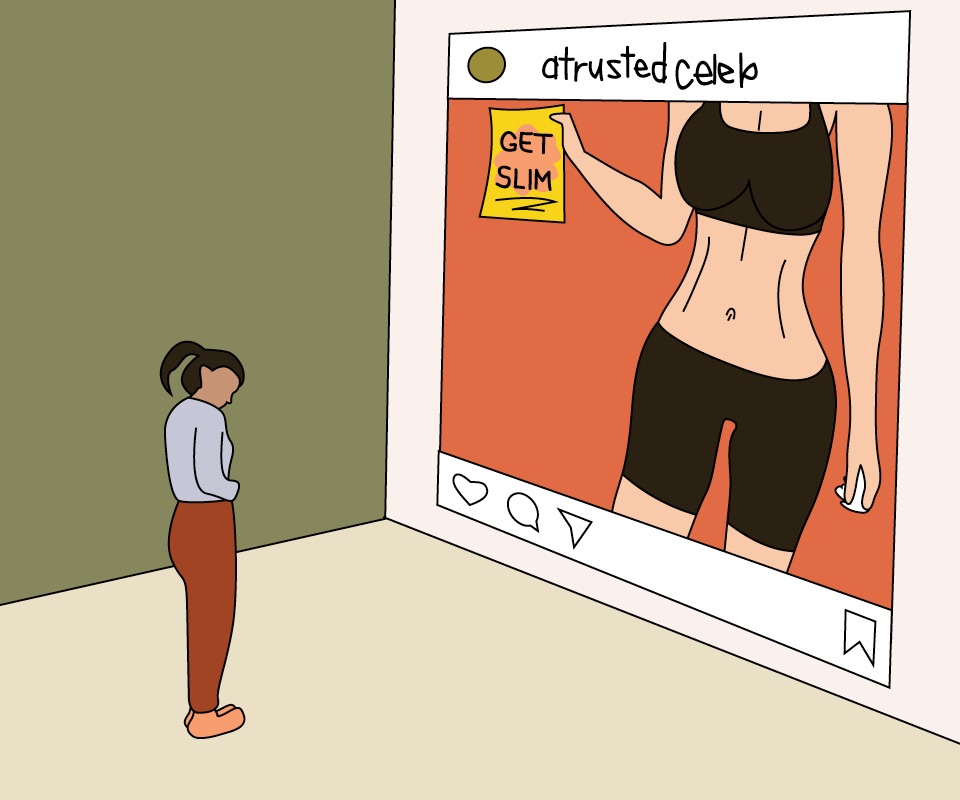TW: dieting, weight, body image
How staying connected on social media can lead us to adopt unhealthy lifestyles
Kylie Jenner is not my best friend. She isn’t even an acquaintance. I have a closer relationship with the Pharmaprix cashier down the street than with Ms. Jenner. So why would I consider regularly chugging liters of magic weight loss tea that she poses with on Instagram?
Every new year, the most telling reason why buying weight loss tea (hot water with leaves in it for an added wet wood flavour) is so popular rears its ugly head. When observing trends through Google, we can see that in every January, the searches for “detox tea” or “detoxing” spike like the bout of nausea coming from getting up too fast after a feast. The new year rolls in and we collectively lose our mind imagining how much Christmas food has ruined us––and an easy fix is needed.
Dozens of health clinics, medical institutions and even government health agencies have addressed the detox craze with the kind of skepticism even flat-earthers haven’t mastered yet. The Cleveland Health Clinic, a hospital located in Northeast Ohio, published an article on the myths related to detox teas in which the chief branding statement that they are healthier, better and more effective for weight loss than other types of tea is debunked immediately. They do not offer more health benefits than your generic green or black tea would. And the National Center for Complementary and Integrative Health agrees that diets relying heavily on “detoxing” include very low-caloric intakes. This can lead to rapid weight loss, but it isn’t sustainable long-term. It could also cause dangerous levels of dehydration. So why am I still strangely attracted to this Ponzi Scheme?
It isn’t surprising why young women, like myself, who spend a huge chunk of their free time on social media, get hypnotized by the online aroma of the detox tea industry. The current digital space we interact with has broken down personalization and the idea of closeness to tiny specks of crushed dust, turning them into cute packaged satchels of drainable financial exploitation ready to destroy our colons. But it’s also making it impossible not to feel close to those we follow––especially celebrities.
Kylie Jenner is not our best friend, but following her on Instagram, Twitter and Snapchat sure makes us feel like part of her life––part of her daily routine. Any marketing executive worth their gross, exploitative, slimy salt has now recognized the value of using social media stars’s influence to sell their products, free of all the artifice that well-produced and mass-marketed advertisements represent. And I’m not here to offer a solution to these methods of advertising to extremely impressionable audiences. I have exited this wild road through the online detox industry with more questions than answers.
I am increasingly worried about the effect of being so connected to people on social media who have such a large influence on our lives. It isn’t just the detox tea; it’s make-up, appliances, electronics, skin care and much more. Our social media feeds us a steady diet of friendly “non-advertising,” a predatory scheme meant to disguise its true nature behind capitalizing on a celebrity’s connectivity to their followers. Although influencers must indicate when their posts are sponsored or containing content that explicitly advertises something, the fact that Instagram is, by its inception, an image-only platform, with captions serving as footnotes to one’s picture, the little #ad at the bottom of a celebrity’s caption isn’t as transparent and effective as Instagram thinks it is.
Influencer ads should scare us more than ever. This detox tea craze can, for all that its marketing tries, lie about its intentions to help women become healthier through a natural process, but it is absolutely impossible to hide the truth from being said out loud: our generation is starving itself and these prettily-packaged products are just fueling unrealistic standards of beauty. I’ll tell you right now, those testimonials will not be found on the main page of FitTea or any of its influencer posts.
Graphic by Ana Bilokin
